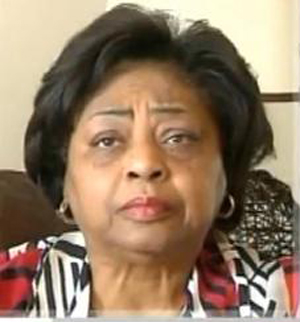
An out of context comment made by Shirley Sherrod, seen here in an interview with CNN posted on YouTube, took over the media spotlight last week. (Credit: CNN, YouTube)
Georgia state official Shirley Sherrod was fired from her post as state director for rural development of the U.S. Department of Agriculture last week after a blog published a short video clip of one of her speeches. The clip, which was given to and first published by Andrew Breitbart’s Big Government site, was unsourced and used out of context. After the whole video was examined, media and government officials have been apologizing to Sherrod and looking at everything that was wrong with the media firestorm surrounding the clip.
The two-and-a-half minute clip which Breitbart posted shows Sherrod, who is black, saying she didn’t help a white man as much as she should have.
The full speech, just longer than 43 minutes, was given in March 2010 at a NAACP gathering. A full viewing of her address contextualizes her statement, as Sherrod explains that that moment was a turning point for her. And, it turns out the incident with the farmer was 24 years ago.
U.S. Department of Agriculture Undersecretary Cheryl Cook asked Sherrod to resign July 19, The Nation wrote. Just two days later, Sherrod was offered another position at the USDA, the Associated Press reported July 21, which she hasn’t decided if she will accept.
Rachel Slajda wrote July 20 on Talking Points Memo that Brietbart said he didn’t have the whole video of Sherrod and that his source only provided the edited clips.
“I think the video speaks for itself,” TPM reported Brietbart said. “The way she’s talking about white people … is conveying a present tense racism in my opinion. But racism is in the eye of the beholder.”
APOLOGIES
CNN reported July 23 that Sherrod considered President Obama’s July 22 phone call an apology, even if he didn’t actually say the word “sorry.”
Sherrod told CNN she didn’t think Cheryl Cook was responsible for asking for her resignation. Secretary of Agriculture Tom Vilsack has apologized.
The Los Angeles Times reported that the story was on the Fox News website July 19 “with the video and the accusatory headline: ‘Caught on Tape: Obama Official Discriminates Against White Farmer.’ That night, O’Reilly called on Sherrod to resign. (She had already agreed to leave her post before the O’Reilly segment aired.)”
Fox News’ Shepard Smith criticized Fox News July 21 on his program for “hyping” the story and playing the video clip “totally out of context,” The Huffington Post wrote July 21. Smith said his Fox News program didn’t “reference the story in any way for many reasons,” including that the video was anonymously sourced, without context, and that his studio didn’t trust Breitbart.
O’Reilly has apologized to Sherrod.
The NAACP originally was “appalled” by Sherrod’s comments, Fox News wrote. Later, the NAACP released a statement on its website on July 20, which said that the organization believes it was “snookered by Fox News and Tea Party Activist Andrew Breitbart” in its initial condemnation of Sherrod’s statement.
24-HOUR NEWS CYCLE
Ruth Marcus wrote July 23 on The Washington Post’s post partisan opinion blog that the Shirley Sherrod incident perhaps indicates a need for “slow blogging.”
Even though “blogging is about speed,” Marcus wrote that slow blogging and slow news would prevent stories like Sherrod’s from happening. Noting that “shrillness sells,” and “even-handedness goes unclicked” Marcus wrote that it’s easy to throw something out there in the blogosphere and correct it if it’s wrong.
“The Sherrod affair reminds us all that slow, or at least slower, news is often better news,” Marcus wrote.
Alexandra Petri also blogged July 21 on post partisan that the whole Sherrod firing, apologizing, and rehiring could have been avoided if someone had stopped and taken a moment to look at the complete video:
“We live in a frenzied, 25-hour news cycle. We’re tweeting, opining, trying to be the first out the gate with the boldest response, the snappiest reaction. Reflex has replaced reflection. If someone had just taken the 45 minutes necessary to watch Sherrod’s speech and respond to it thoughtfully, we might have been spared 24 hours of embarrassment. But no one did.”
President Obama said Vilsack “jumped the gun” in asking for Sherrod’s resignation “partly because we now live in this media culture where something goes up on YouTube or a blog and everybody scrambles,” Mediaite reported July 23
Politics Daily wrote July 22 that the whole situation could have been avoided if the government had effectively dealt with the story before the media got wind of it. Talking Points Memo wrote July 21 that Sherrod had e-mailed Vilsack that the clip was going to be made public before Breitbart published it, but that Vilsack says he never got the message.
A New York Times editorial reported that Sherrod said when she was called July 19 to be asked for her immediate resignation, she was told there was a good chance the story would “be on Glenn Beck tonight” and that she had to send in her resignation immediately.
Glenn Beck said she wasn’t booked that night and he didn’t mention the story.
ETHICS
The Society of Professional Journalists’ code of ethics advises that journalists:
-
Test the accuracy of information from all sources and exercise care to avoid inadvertent error. Deliberate distortion is never permissible.
-
Diligently seek out subjects of news stories to give them the opportunity to respond to allegations of wrongdoing.
-
Identify sources whenever feasible. The public is entitled to as much information as possible on sources’ reliability.
-
Make certain that headlines, news teases and promotional material, photos, video, audio, graphics, sound bites and quotations do not misrepresent. They should not oversimplify or highlight incidents out of context.
-
Admit mistakes and correct them promptly.
BREITBART
As for Breitbart, who first published the edited video clip, Sherrod hasn’t received an apology and CNN reported she doesn’t expect it.
“He would really need to come and sit down with me and look me in the eye so that we could see if we could find a place – I’m not saying I wouldn’t forgive him, but we would need to see if we could find a place for that to happen.
“I don’t see it at this point. He hasn’t been willing, he hasn’t tried to apologize to me for anything he’s caused me to go through,” CNN reported Sherrod said.
CNN reported Breitbart said on Anderson Cooper’s program that he doesn’t have to apologize to Sherrod. “What would warrant an apology? … I’m not the one who threw her under the bus.”
Ann Coulter argues that Breitbart was set up.
Matt Lewis wrote July 21 on Politics Daily that Coulter thinks that Breitbart should expose his source because that person “has to know what the full speech said, and whomever sent only that segment to Andrew Breitbart is the one who should apologize to Shirley Sherrod.”
But, Breitbart doesn’t have a lot of company with that view.
National University journalism professor Sara-Ellen Amster wrote on Huffington Post July 23 that Breitbart should at the least apologize to Sherrod.
“There’s no excuse for journalistic incompetence that inflicts harm. Yes, the act targeting a public official may be protected by the First Amendment, but no journalist should use that privilege to be reckless.,” Amster wrote.
Calling the edited video a “terrible injustice,” Amster wrote that Breitbart has “shamed the blogging world.”
“Without adhering to any standards, without issuing an acceptable apology to Sherrod, Breitbart confirms that he is no better than the worst yellow journalist, the kind that think they are better than the public and do not need to be accountable to anyone,” Amster wrote.
As of July 24, the only correction on Brietbart’s post says “Correction: While Ms. Sherrod made the remarks captured in the first video featured in this post while she held a federally appointed position, the story she tells refers to actions she took before she held that federal position.”
Media Matters, a progressive media watchdog, collected several denouncements of Breitbart by mainstream media July 22, including reactions from Politico, MSNBC and NPR.
Politico’s Ben Smith wrote July 22 that “Breitbart’s sites now have a growing credibility problem.” MSNBC’s Lawrence O’Donnell said July 22 that Breitbart “has lost his standing to present videos to the country at any time.” NPR’s public editor Alicia Shepard said that “Any journalist would seek comment. If Breitbart does not, he is not a journalist.”
Steve Myers wrote for Poynter July 22 that “a blog post on Politico says Breitbart displayed ‘unusual contrition’ in posting the correction, but it doesn’t ‘quite own up to the seriousness of the error he committed — posting a video misleadingly edited.”
Myers wrote that Breitbart uses the correction to “reframe the story,” focusing on the audience’s reaction to Sherrod’s story instead of what Sherrod says.
Mitch Albom wrote for the Detroit Free Press July 25 that “the blame lies” with Breitbart for the Sherrod story. The problem is that Breitbart isn’t “held to any standard” and that while he is responsible for the story, “he spins and points to anyone else” for the blame.
“It’s not journalism if you look for only one point of view, post other people’s stuff and don’t even acknowledge how using chopped-up material to paint a full picture is wrong,” Albom wrote.
Breitbart’s biography on Big Government says that he said “gained greater notoriety when his second blog endeavor, Big Government, broke the ACORN prostitution scandal.”
StinkyJournalism wrote about the ACORN scandal March 28. ACORN, a nonprofit advocacy organization, was exposed in a video scandal last year. The footage showed two activists – James O’Keefe and Hannah Giles – dressed as a pimp and prostitute, asking ACORN employees for help in setting up brothels and evading taxes. As a result, ACORN lost its federal funding and disbanded earlier this year. But it turned out the footage was edited and that the two had entered the offices dressed in ordinary clothes. Breitbart released those videos, but said in March that he didn’t know what was on the videos when he published them.
The Boston Globe wrote July 24 that “the Shirley Sherrod incident has all the same elements” as the ACORN controversy: conservative blogger Andrew Breitbart, Fox News, and an edited, incomplete video.
StinkyJournalism wrote Jan. 16, 2010 about Breitbart’s launch of BigJournalism, and his claim that he is both skeptical and biased.
UPDATE: 7/28/2010 11:05 AM: Editor’s note to add link was removed from sentence.
UPDATE: 10/08 11:32 AM EST: See our Aug. 5 update on the Shirley Sherrod story here.
UPDATE: 10/08/2010 11:32 AM EST: The New York Daily News has an update on the Sherrod story here. “Newly released e-mails” show that she was asked to resign before the entire video surfaced – so the government didn’t have all the facts or context. Further, the e-mails don’t indicate “if the White House ordered the firing.” Sherrod requested in her resignation letter that the whole video be viewed by Cheryl Cook, who called for her resignation. See the LA Times’ story here.







Comments Terms and Conditions